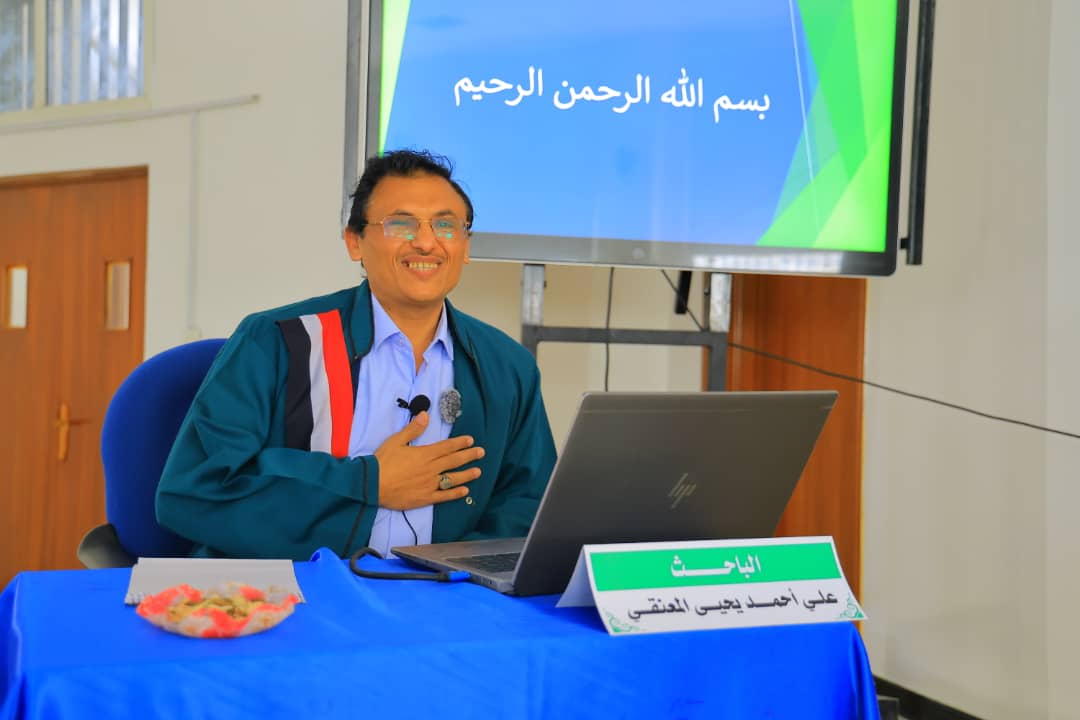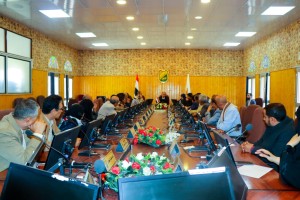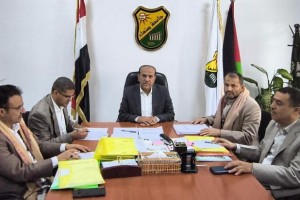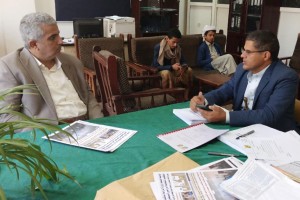Public PhD Viva-Voce Examination of Mr. Ali Ahmed Yahya Al-Ma’anaqi, from the Department of the Arabic Language and Literature, Faculty of Arts & Humanities – Sana’a University
- Categories Letters and Promotions - Graduate Studies, news, Regulations - Postgraduate Studies
- Date April 18, 2025

Mr. Ali Ahmed Yahya Al-Mannaqi has been awarded the PhD Degree majoring in Syntax and Morphology, from the Department of the Arabic Language and Literature, Faculty of Arts & Humanities – Sana’a University. His dissertation, titled “A Study of the Linguistic Principles of Al-Hasan bin Ahmad Al-Jalal with the Verification of His Commentary on the book ‘Al-Kashaf’,” was officially defended on Wednesday, Shawwal 11, 1446 Hijri corresponding to April 9, 2025.
The Viva-Voce Committee, which was formed based on a resolution issued by the Post-Graduate Studies and Scientific Research Council, consisted of the following:
1. Prof. Abdulkarim Musleh Ahmed Al-Bahla, External Examiner, Dhamar University, Chairperson.
2. Prof. Ibrahim Mohammed Said Al-Selwi, Main Supervisor, Sana’a University, Member.
3. Prof. Ahmed Hassan Hassan Al-Arosi Internal Examiner, Sana’a University, Member.
The primary objectives of the dissertation were to:
1. Illuminate the contributions of the scholar Al-Hasan ibn Ahmad Al-Jalal to Arabic linguistic and grammatical research, emphasizing his innovative approaches that had not been previously documented.
2. The study examined his linguistic origins and presented a model through his commentary on Al-Kashaf, serving as a partial elucidation of these origins.
This work seeks to enhance the dissemination of heritage and enrich the Arabic literary corpus, thereby granting Arab readers access to the literary contributions of Yemeni scholars the thing that have remained largely unrecognized.
In his thesis, the researcher revealed several significant conclusions, the most notable of which include:
1. Yemeni grammar, particularly among Zaydi scholars, exhibits a dynamic quality, stemming from their belief in the necessity for qualified scholars to engage in independent reasoning.
2. Al-Jalal possessed an unprecedented perspective on grammar, evident in his classifications and divisions, as well as in his definitions of grammatical determinants and justifications for grammatical rules.
3. In his analysis of grammatical rules and classification, Al-Jalal emphasized the importance of meaning.
4. The commentary produced by Al-Jalal serves as a compelling illustration of his application of grammatical principles and rules.
5. Within the commentary, Al-Jalal addressed numerous linguistic rules encompassing both rhetoric and grammar, while also articulating his rhetorical approach without segregating it into a distinct classification.
The researcher also suggested several recommendations, including:
1. The necessity for rigorous scholarly studies focused on Yemen’s scholarly heritage across various disciplines, as the existing research on Yemeni heritage studies—both verified and unverified—remains limited.
2. A comparative analysis between Al-Jalal’s commentary on Al-Kashaf and other Yemeni heritage works related to Al-Kashaf—such as commentaries, annotations, or refinements—to illustrate the unique Yemeni perspective in its engagement with Al-Zamakhshari’s interpretation.
3. An emphasis on the verification of Yemeni heritage in language and other fields, given that much of it remains unexplored or confined to archives. This includes conducting studies on verified heritage that may contain numerous inaccuracies.
The Viva-Voce was attended by several academics, researchers, students, and several colleagues and family members of the researcher.
Discover more from Sana'a University
Subscribe to get the latest posts sent to your email.
Previous post






